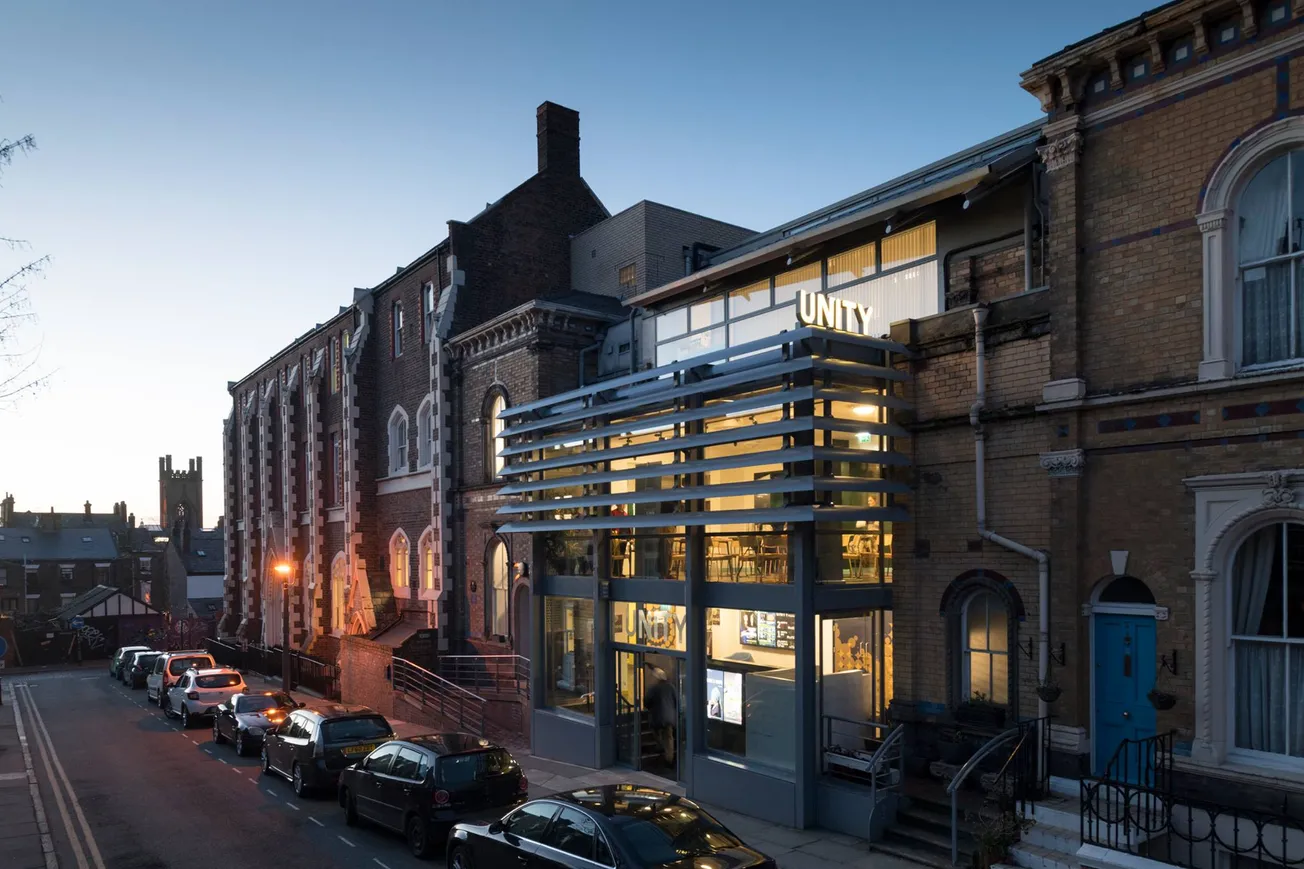An uncertain future is facing one of Liverpool’s greatest theatres

The Unity has long been a pillar in the city’s theatre scene. But it’s not been an easy year for those at the helm
Dear readers — for nearly a century, the Unity Theatre on Hope Place has wowed audiences across the city with genre-bending experimental theatrical performances born from its proud working class history. Despite its successes and stellar reputation, running such an unconventional theatre is by no means an easy job, and in recent months the Unity has been hit with a series of departures and cancellations that have left it shaken. So what’s on the cards for one of Liverpool’s most loved theatres? In today’s piece, Abi finds out how the Unity plans to keep its radical spirit alive while coping with the financial challenges small theatres across the UK are facing.
But first, your Post briefing — including a shock defection from the Labour Party and the closure of Pontins in Southport.
Your Post briefing
Wirral Labour councillor Gail Jenkinson has made a shock defection to the Green Party over greenbelt land. Jenkinson was first elected back in May 2023, and was one of the first Labour councillors for the ward of Greasby, Frankby and Irby. In a statement issued yesterday, she said she had to “keep the promises I made when I was elected”, and could “only do this as a member of the Green Party”. She continued: “I love the place where I grew up and still live and I speak to residents every day. I cannot do this honestly as Labour changes its policies, particularly now it is saying it will relax controls on building on the greenbelt.” Wirral's Green Party co-leaders Pat Cleary and Jo Bird said they were delighted by her defection.
Wirral Council is assessing plans to build over 40 new homes on a site destroyed by a gas explosion six years ago. The plans for Woodhead Street car park in New Ferry would see the creation of 10 flats and 33 homes, as well as a small green space for residents. However, the plans have already been criticised by local community group New Ferry Residents Association, with concerns raised over the lack of shops and car parking spaces with disabled access. A petition has been set up calling for the Woodhead Street car park to be left as it is, with a final decision yet to be made over its future.
Pontins in Southport has announced its permanent closure, just two months after two other sites were shut in the UK. Pontins — which is owned by Britannia, the same firm who owns the Adelphi Hotel in Liverpool city centre — said it had come to the “difficult decision” to shut the Southport site after assessing the viability of its parks. Staff were only told about the closure yesterday, just hours before news broke the site would be closing for good. Sefton Council, which is the landowner in Southport, said they had also not been informed about the closure.
The Unity Theatre has had a chaotic few months. Their theatre festival programme, scheduled for the end of 2023, was cancelled amid financial troubles. Their website shows little in the way of performances to expect in 2024, with only a smattering of comedians taking to the stage in Spring before their calendar falls empty. And just a month ago, Gordon Millar — the theatre’s artistic director and CEO — announced that he was leaving to become the director of the Edinburgh Playhouse.
“It’s certainly been quite a transitionary period for us,” is the polite response from Luke Bryant, Unity’s marketing lead. Getting him on the phone was no easy feat; after sending countless emails and LinkedIn requests to board members, directors, and staff over recent weeks, he’s the only person available to talk about the theatre. Understandably, the staff have a lot on their plate.
The Unity Theatre was formed by directors Gerry Dawson and Edgar Criddle in the 1930s. Known back then as the Merseyside Left Theatre, the Unity prided itself on producing radical and experimental work. Though it did stage classic plays, what made the theatre truly special was its more modern left-wing performances, predominantly aimed at working class audiences. Yet nearly 100 years later, the beloved institution finds itself in troubled waters. The financial reality of running such an unconventional theatre has prompted an identity crisis, struggling to nurture the homegrown talent that remains central to their ethos while remaining afloat. Whether it succeeds in steadying the course has wider ramifications for Liverpool’s theatre and arts scene.
“There’s a kind of financial crisis across the UK which has been going on for years and years,” says Ros Merkin, a drama lecturer at Liverpool John Moores University. She says that when Gordon Millar took over the theatre back in 2018, the institution was already in a tricky financial position. He had to “work quite hard to keep [Unity] going.” Despite receiving a three-year grant from the Arts Council back in 2022, Merkin says money “continues to be squeezed”.

Unity isn’t alone in this — the entire sector has been struggling for some time. Back in June, Liverpool’s Epstein Theatre was forced to close after the council stopped its annual £100,000 funding amid budget cuts, while just a few short weeks ago, the National Theatre Wales was informed it would lose 100% of its £1.6 million funding from the Arts Council. The theatre said it was “shocked and dismayed” by the decision.
Yet the Unity has a unique set of problems that stretch beyond its financials, one of which is the loss of Gordon Millar. Joining the theatre back in January 2018, Millar was considered by much of the staff there to be a vital cog, putting on hits like the National Youth Theatre’s Lost Boys, and the VR musical Double Life from the acclaimed Leo & Hyde. With Millar gone, an air of uncertainty looms over the theatre’s head.

Latest
This email contains the perfect Christmas gift
Merseyside Police descend on Knowsley
Losing local radio — and my mum
And the winner is...
An uncertain future is facing one of Liverpool’s greatest theatres
The Unity has long been a pillar in the city’s theatre scene. But it’s not been an easy year for those at the helm